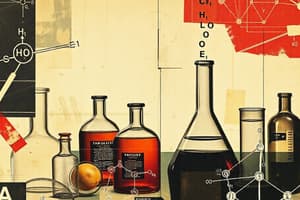Podcast
Questions and Answers
Which phase of water is less dense than its liquid phase?
Which phase of water is less dense than its liquid phase?
- Liquid
- Solid (correct)
- Vapor
- Gas
What is the most important type of compound that does not contain carbon and hydrogen?
What is the most important type of compound that does not contain carbon and hydrogen?
- Organic compound
- Carbohydrate
- Hydrocarbon
- Inorganic compound (correct)
Which group in the Periodic Table of Elements contains the most elements?
Which group in the Periodic Table of Elements contains the most elements?
- Group 2
- Group 18 (correct)
- Group 1
- Group 17
What are the two most reactive groups of metals in the Periodic Table?
What are the two most reactive groups of metals in the Periodic Table?
Which group of elements in the Periodic Table is the most unreactive?
Which group of elements in the Periodic Table is the most unreactive?
Which group of elements in the Periodic Table is known as the halogens?
Which group of elements in the Periodic Table is known as the halogens?
How many periods are there in the Periodic Table of Elements?
How many periods are there in the Periodic Table of Elements?
What are the two most reactive non-metals in the Periodic Table?
What are the two most reactive non-metals in the Periodic Table?
Which particles make up an atom?
Which particles make up an atom?
What are chemical formulas used to describe?
What are chemical formulas used to describe?
What are chemical equations used to describe?
What are chemical equations used to describe?
Which type of compounds are formed between positive and negative ions?
Which type of compounds are formed between positive and negative ions?
Which type of compounds usually occur between two nonmetals?
Which type of compounds usually occur between two nonmetals?
What is the pH range of acids?
What is the pH range of acids?
What is the pH range of bases?
What is the pH range of bases?
Flashcards are hidden until you start studying
Study Notes
Properties of Water
- Ice is the phase of water that is less dense than its liquid form, allowing it to float on water.
Chemical Compounds
- The most important type of compound that lacks carbon and hydrogen is known as inorganic compounds.
Periodic Table Groups
- The group with the most elements in the Periodic Table is the Transition Metals group.
- The two most reactive groups of metals are the Alkali Metals and the Alkaline Earth Metals.
- The most unreactive group of elements is the Noble Gases.
- The group known as the halogens includes Fluorine, Chlorine, Bromine, Iodine, and Astatine.
Structure of the Periodic Table
- There are a total of seven periods in the Periodic Table of Elements.
Reactive Non-Metals
- The two most reactive non-metals are Fluorine and Chlorine.
Atomic Structure
- Atoms are made up of three main particles: protons, neutrons, and electrons.
Chemical Descriptions
- Chemical formulas provide a concise way to describe the composition of a substance, indicating the type and number of atoms present.
- Chemical equations are used to represent chemical reactions, illustrating the transformation of reactants into products.
Types of Compounds
- Ionic compounds are formed between positive and negative ions, typically between metals and nonmetals.
- Covalent compounds usually occur between two nonmetals, involving the sharing of electrons.
pH Ranges
- The pH range of acids typically lies between 0 and 7.
- The pH range of bases is generally from 7 to 14.
Studying That Suits You
Use AI to generate personalized quizzes and flashcards to suit your learning preferences.




